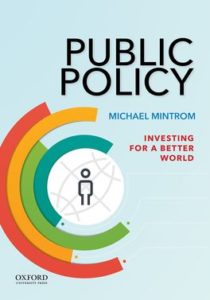We can only see the true value of the public sector when we start looking at government spending not as a cost, but as an investment, according to The Australia and New Zealand School of Government (ANZSOG) Professor Michael Mintrom.
At the launch of his new book Public Policy: Investing for a Better World in Canberra, Professor Mitrom said: “the view expressed throughout the book is that
“Public policy is critically important to the quality of human life,” Professor Mintrom said.
“By extension, this means that those who engage in policy development and advising are doing fundamentally important work. Doing this work well requires their being open to exploring evidence on what works. It also requires their developing creative ways of conveying advice to members of the public and to decision makers.”
Professor Mintrom’s new book, Public Policy: Investing for a Better World, analyses policy across a wide range of areas, focusing on them as public investments, which create public value. It goes beyond a simple cost-benefit analysis and sees well-designed public policy as an effective platform for further policies and practices which add value to citizens’ lives.
“The change agenda presented here comes as a call for policy analysts to see their work as guiding the making of policy investments,” Professor Mintrom said.
“Good investment advice is based on sound interpretation of relevant information. It is tailored to meet the needs of those receiving it. The contention of this book is that all of us should care deeply about policy legacies, as they strongly influence our future.
“There is a lot of work to be done and it is noble work. It is work that, collectively and cumulatively, will contribute to the greatest promise of public policy: making a better world.”
The book is intended as a textbook and includes chapters on key issues, such as defence, education, environmental protection, health, and criminal justice, pulling together research on how investment in these issues can benefit society. Many of the examples are from the USA, but the broader policy lessons are applicable across the world.
For example, the criminal justice chapter details innovative US programs which are developing investment-based strategies aimed at reducing incarceration, while reducing crime. These have included developing alternatives for prisons, improved drug addiction treatment, and reinvesting savings from reducing prison numbers into communities which produce high numbers of prisoners.
ANZSOG Dean and CEO Professor Ken Smith agreed with Professor Mintrom’s defence of the value of public investment in public policies.
Professor Smith said there was a “false distinction between the private and public sectors, and how they create value” and that government’s role should not be limited to cases of market failure.
“Public sector investment may be principally focused on service delivery, but we should acknowledge the sector does create intellectual property that is then built upon further, providing the basis upon which the private sector can be entrepreneurial,” he said.
Professor Helen Sullivan, director of ANU’s Crawford School of Public Policy, said the book “gives us a reason why we should enjoy paying tax”, and provided a broader, well-argued framework for thinking about public policy.
Michael Mintrom is professor of Public Sector Management at Monash University. He holds a joint appointment as the Monash Chair at ANZSOG, where he serves as Academic Director of the Executive Master of Public Administration (EMPA) degree. He is a past president of the Public Policy Section of the American Political Science Association.


Leave a Reply